#german theologian
Text
"First they came for the communists, and I did not speak out Because I was not a communist. Then they came for the socialists, and I did not speak out Because I was not a socialist. Then they came for the trade unionists, and I did not speak out Because I was not a trade unionist. Then they came for the Jews, and I did not speak outBecause I was not a Jew. Then they came for me - and there was no one left to speak for me."
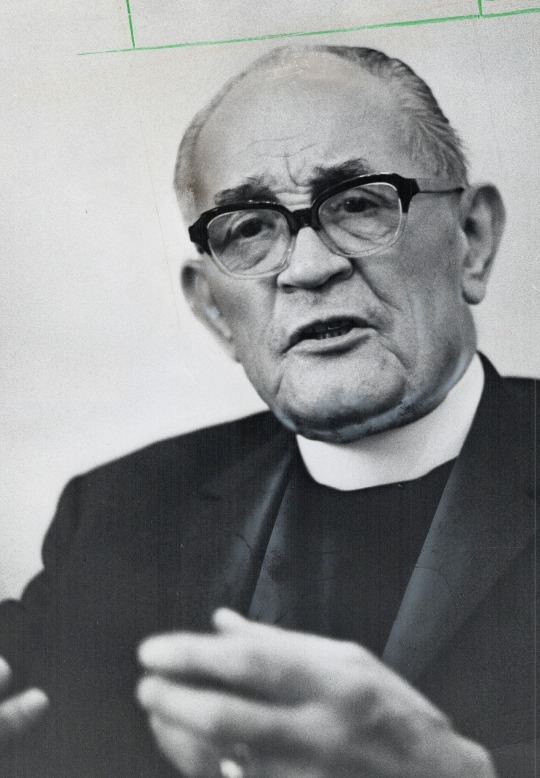
Friedrich Gustav Emil Martin Niemöller was a German theologian and Lutheran pastor. He is best known for his opposition to the Nazi regime during the late 1930s.
Born: 14 January 1892, Lippstadt, Germany
Died: 6 March 1984, Wiesbaden, Germany
#today on tumblr#quoteoftheday#Theologian of the German Protestant Church#Preacher and theologian in Nazi Germany#Opponent of Hitler#Dachau concentration camp#Religious freedom advocate#Voice of conscience#Christian resistance movement#Protestant opposition to the Third Reich#Political prisoner#Ecumenical movement#Post-war reconciliation efforts#Cold War activism#Peace and justice advocate#Interfaith dialogue#Legacy of courage and activism#Martin Niemöller#German theologian#Lutheran pastor#Anti-Nazi activist#Resistance against the Nazi regime#Theologian and pastor during Nazi Germany#Protestant resistance#Confessing Church#Holocaust resistance#Persecution of Christians in Nazi Germany#Pastor's Emergency League#Concentration camp survivor#Post-war reconciliation
2 notes
·
View notes
Text

Title/Name: Martin Luther, (1483–1546).
Bio: German priest, theologian, author, hymn writer, professor, and Augustinian friar.
Country: Germany
Wojak Series: Grug (Variant)
Image by: Unknown
Main Tag: Martin Luther Wojak
#Wojak#Martin Luther Wojak#Luther Wojak#German#priest#theologian#author#Writer Author#Writer#hymn writer#professor#Augustinian friar#Augustinian#Friar#Theology#Martin Luther#Grug Series#White#Brown#Black
11 notes
·
View notes
Text
The courage to be is the courage to accept oneself, in spite of being unacceptable.
Paul Tillich, The Courage To Be.
#philosophy tumblr#german philology#philoblr#theologian#philosopher#thinker#german authors#paul tillich#meta ethics#self#self acceptance#self transformation#courage#being#dark academia#life quotes
11 notes
·
View notes
Text
He himself opened his mouth, in order that I may kiss more deeply.
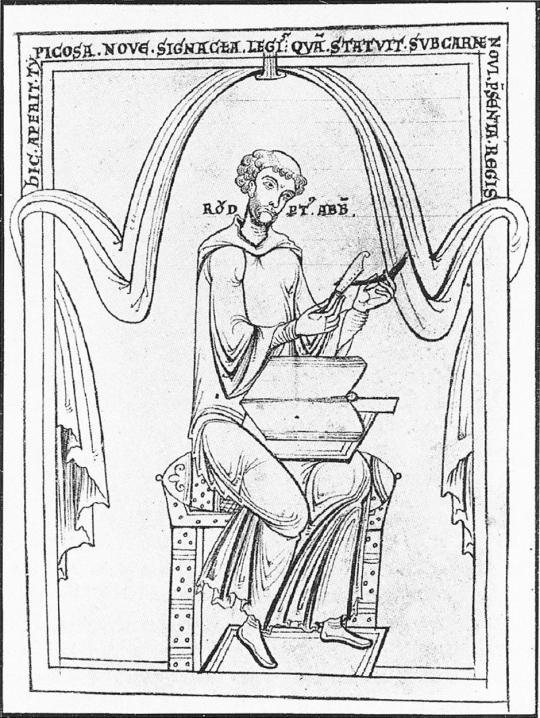
Rupert of Deutz is a 12th-century German Benedictine monk and theologian who had a mystical homoerotic encounter with Jesus. He wrote, “I took hold of him [Christ] whom my soul loves. I held him. I embraced him. I kissed him lingeringly. I sensed how gratefully he accepted this gesture of love when, between kissing, he himself opened his mouth, in order that I kiss more deeply.” Rupert of Deutz died on March 4, 1129. May we all be uplifted by his memory!
1K notes
·
View notes
Note
https://en.wikipedia.org/wiki/Judensau
luther inspired hitler, following him is a step away from following hitler
Welcome, beloved. I don't want to dismiss your message, but I do want to make some things clear. I, like many, have horrors in my religion that I have to be able to address, and prejudices that I do not perpetuate consciously but know that I nonetheless have absorbed from culture, and am responsible for healing. Antisemitism within Christianity is a huge topic, with people devoting their lives to studying it. I would not fault any Jewish person for antagonism toward my communities--you would be right to be wary, and if I intend to continue participating in these communities, I must be able to understand and accept any justified anger or distrust coming my way.
I'd encourage everyone reading to learn more about this through the Wikipedia link, but a brief description/summary for those who don't want details/images: The mentioned article is about an antisemitic artistic trope from the Middle Ages. The church where Martin Luther preached included an image of this sort from 1305.
Martin Luther was antisemitic. This isn't up for debate. There is more to say, of course--we can look at how his attitudes changed over his life (for the worse, to be clear), we can talk about the extent to which he specifically influenced Nazism (this is a complicated conversation that I'm not qualified for)--but he was undeniably, horrifically, antisemitic. There's a Wikipedia page solely devoted to this topic.
That said, there's huge diversity within Lutheranism, seeing as it's a large religious tradition, and if you're interested in learning about Lutheranism and Hitler specifically, I'd encourage you to look into the split within the German Lutheran Church in 1933 and Dietrich Bonhoeffer, the Lutheran theologian who was hanged at the Flossenbürg concentration camp. It's fascinating to look back at that while living through such religious division in America right now.
Luther was a complicated man, who did not set out to found a church, and opposed the term "Lutheran." He was attempting to reform the Catholic Church from the inside, because he himself was Catholic. Not a very good one, obviously, but he didn't consider himself anything else. He was a monk for a time, then an academic, and his beliefs got him excommunicated. I've read some of his writings, but not all. I find value in them, while disagreeing with a lot of it. Lutheranism is a space with which I have fellowship with God and humanity, not a set of rules or a devotion to every word of a man from the 16th century. I'm not interested in excusing or defending him, nor do I feel the need to honor him in any way. I hope I disappoint him completely.
I am a Lutheran Christian--and I would not fault anyone for thinking those words function similarly. So to explain: I'm a Christian as in I follow Christ, devote myself to his teachings, pray to him, and live for him every day. I'm a Lutheran as in I am a member of a church and culture that traces back to communities of German Protestants who identified with the theology of Martin Luther. I do not follow Martin Luther. I do not follow Lutheranism. I follow God, and participate in Christianity often within Lutheran communities--primarily because of my heritage and the music.
Protestants don't have Saints in the Catholic sense, nor do we have a pope. Martin Luther is not our Saint, or someone we pray through, or our leader. We don't read his writings in church, we don't look to him for answers. He's someone many people have found wisdom in, someone who has inspired countless reformers, but he is a man. A saint in the Lutheran sense, a lowercase-s saint, a member of Christ's community--a sinner from his mother's womb. He probably wrote more about his own sin then you ever will. He devolved into conspiracy, and said horrible things about Judaism and Catholicism and Islam, and we have seen the legacy of German antisemitism (which he did not create, but obviously contributed to), and it's a good thing I don't idolize him. I honestly don't think about him very much. Yes, I read his catechism in Bible classes, but we were free to disagree with it--we were using his most basic writings as a starting point. The words of his that are most present in my life are his hymns, which we do sing often. His teachings were intended to lead people to the Bible rather than leaders/traditions, which is why he translated the Bible into German, and why I go to the Bible, not to him. I learned about his antisemitism growing up, and prayed for repentance on behalf of my ancestors.
There are people who hold Luther in higher esteem than me, to be sure. Do I think they're basically following Hitler? I don't know. It depends why they value him, I would say. Idolizing anyone is dangerous, especially men in the 1500s. I can think of no historical male writer I value that was not at least slightly misogynist. The two authors I've read today, Virginia Woolf and Shakespeare, both have antisemitic writing. Countless people sainted by the Catholic Church, and countless popes, have been antisemitic. There is no innocent tradition. I'm not trying to excuse any of this, or say we shouldn't be critical, but this is why we don't base religions on people. They have to be founded and organized by people, which means there's going to be issues (and Christianity's are quite obvious), but Christians have to remind ourselves every day that the only human we worship is the one who was God.
I wish you well, beloved. I'm glad you see the evil in my religion, genuinely. Not enough people do. I hope you continue educating people and being active in your fight against antisemitism--if you're not Jewish yourself, hopefully this shows up more as supporting Jewish people and communities, and less like borderline accusing people online for following Hitler because they still use the word for their traditions that their Norwegian great-grandparents did, because it's the word that stuck from the beginning. We're named after Luther's excommunication, not his antisemitism--Catholics would have had to change their name to Lutheran too if that was the theological issue happening. There's a whole conversation to be had on whether we should call ourselves Lutheran, but regardless, the communities and heritage exist, and will continue to evolve.
May God have mercy on the crimes of my community members. May God lead me to walk in the way of justice. May our religion serve us, and may we serve God.
<3 Johanna
#always feel ill equipped to talk about this subject#and feel dismissive when I don't#so here's what i got today#i love you jewish followers
77 notes
·
View notes
Photo

Diagram showing what various lunar eclipses would look like with differently shaped Earths. Johannes Buno, ca. 1711.⠀ ⠀ Featured in the German theologian and educator's Universal Geography. Buy a print here: https://publicdomainreview.org/product/four-diagrams-of-solar-eclipses/
39 notes
·
View notes
Note
Hello. This is a rather mundane question considering all the things, but I got curious. Does Hebrew have accents? How do they vary in and out of Israel?
I understand if you choose not to reply as this is a difficult time for you. In any case, take care🩷🩷🩷
Hi Nonnie! No, don't worry, all questions that are truly interested in Jewish culture are welcome! ^u^
TBH, something to remember about Hebrew is that it has quite a unique history. To the best of my knowledge, it is the only language that was used on a daily basis as the lived in language of a native population, then "died" as a result of Jews being exiled. As they found themselves in other countries, they had to speak the local language. They didn't abandon Hebrew, but it stopped being the langauge in which they lived their daily lives. Hebrew became the language of prayer, of scripture study, and terms from it bled into the local languages Jews spoke, creating Jewish versions of these languages (Yiddish being the Jewish version of German, Ladino being the Jewish version of Spanish, Yevanik being the Jewish version of Greek, and there are also Jewish versions of Arabic and other languages, too), so Hebrew still had an impact on Jews, and they were still connected to it... but it was no longer a "living" language. It was closer to what Latin is today. A language in which religious ceremonies are conducted, that theologians study, but not a language that anyone conducts their daily life in.
Then, as a part of the project of reclaiming and reviving the Jewish native life in Israel that came to be known as Zionism, people set out to revive our native language, too. There was a realization that it had to be adapted to modern life, give it terms for things that didn't exist 2,000 years ago, so it would be useful for people who wanted to conduct their daily lives in Hebrew again. And that's how the last of the Canaanite languages became the only "dead" language to be revived, and return to be the lived in language of its native people.
I mention this unique history, because modern Hebrew isn't the same as biblical Hebrew (though about 60% of modern Hebrew IS biblical). It means if there were different Hebrew accents during biblical times, we don't know it for sure.
At the same time, the fact that Jews were spread out in the diaspora, and their pronunciation of Hebrew (as a dead language) came to be influenced by the local languages they spoke while in exile. So a Jew who returned to Israel from the diaspora in Germany, a Jew who returned to Israel from the diaspora in Argentina, and a Jew who returned to Israel from the diaspora in Yemen do not have the same accent when speaking Hebrew.
But these are not considered regional accents of Hebrew in the same way that you can find different regional accents of English when traveling across England... If we put aside the accents of Jews returning to Israel, and instead we look at the accents of Jews born in Israel, the ones born into speaking modern Hebrew, there's a myth of a Jerusalem accent. I say myth, because you'll hear all over Israel people swearing, that Jerusalemites pronounce a few words differently. The most common example is the word 'mataim' (which means two hundred), and many Israelis insist Jerusalemites pronounce it ma'ataim, with the first vowel prolonged and emphasized. I have lived in Jerusalem since 2002 and I have never heard it. I think in this sense, regional accents are usually, at least in part, a product of geography. It determines how far apart people live, how much they interact, how much they hear others speaking the same language as they do. The smaller a country, and the easier travel in it is, the fewer accents it's likely to produce. And I think that's the main reason why there aren't really accents in Israel (other than those of people who came to speak Hebrew as a second language), because it's a very small country, and because today, it's pretty easy to travel in it (you can cross it from the most northern point to the most southern one in slightly over 5 hours).
I hope that kind of answers it? Thank you for the kind words, I hope you're well, too! xoxox
#ask#anon ask#israel#hebrew#jewish history#jewish#jew#jews#jumblr#frumblr#native israeli#native history#cultural revival#language revival#native revival
79 notes
·
View notes
Photo

Germ Theory
The Germ Theory, which emerged in the late 19th century, demonstrated that microscopic germs caused most human infectious diseases. The germs involved included bacteria, viruses, fungi, protozoa, and prions. Louis Pasteur (1822-1895), a French chemist and microbiologist, and Robert Koch (1843-1910), a German physician and microbiologist, are credited with the discovery of the germ theory in the 1860s-1880s.
Regarded as the most important discovery in the history of medicine, the germ theory challenged the medical profession to reevaluate how disease was thought about, offered possibilities for both the prevention and treatment of disease, as well as the discovery and implementation of new technologies to combat disease.
Previously, doctors assumed that disease was an internal process of the human body especially Hippocrates' long-standing four humors theory notion that excesses or deficiencies of four bodily fluids (blood, phlegm, yellow and black biles) led to illness and disease. The germ theory contradicted that idea by separating the disease from the afflicted persons. Furthermore, the new theory ushered in a regimented way of classifying diseases (nosology) according to the type of microorganisms causing the disease.
Historical Theories of Disease
Prior to the discovery of the germ theory, various theories were advanced as possible explanations for illness and disease in humans. The earliest theory was the miasma theory attributed to Hippocrates (460-370 BCE), a Greek physician. Derived from the Greek word meaning pollution or "bad air", the miasma theory suggested that decomposing particles from organic materials, plants or animals, poisoned the air. Although easily detected by smell, people who inhaled the "bad air" would become ill. Additionally, planetary movements, disturbances to the Earth, poor hygiene, and polluted water often contributed to miasma. Attempts to remove waste along with cleanliness were thought necessary to improve the atmosphere to avoid infection and disease.
Aristotle (384-322 BCE), a Greek philosopher, offered the spontaneous generation of disease. It was possible, Aristotle thought, for living organisms to spring from non-living matter. Furthermore, this process, like maggots appearing from dead flesh, was a regular and natural phenomenon.
Galen (129-216 CE), a Roman physician, extended Hippocrates' earlier speculation about the imbalance of bodily fluids as the cause of disease. Galen attached each of the four humors to a particular season characterized by hot, cold, dry, and wet. For example, colds and flues occurred most often during cold and wet weather. Any change in the weather or season could upset the balance of the four humors so treatments were devised to restore said balance e.g., purges, bloodletting, enemas, and vomits. These ancient theories dominated Western medical thinking about illness until the 19th century.
Another theory of the origin of diseases referred to supernatural causes. A person's sins resulted in contracting a disease or illness as a punishment from the gods or God. Ghosts, demons, and evil spirits also possessed the ability to afflict a person with illness. Magic, divination, spells, exorcism, and various drugs were used to diagnose and treat illness. It fell to a variety of healers – shamans, priests, diviners, medicine men – to drive away the evil spirits. Illness as a punishment for sins, as well as a test of faith, was later offered by Christian theologians as an explanation for disease.
Additional theories on the origin of diseases continued to emerge. Girolamo Fracastoro (1476-1553), an Italian physician, is credited with first using the word "contagion" when describing the transmission of illness. His "seeds of disease" theory argued that disease could be spread by direct or indirect contact or over long distances through no contact at all. A German chemist, Justus von Liebig (1803-1873), one of the early founders of organic chemistry, suggested that as a result of a chemical process from decaying organic matter, disease simply emerged in the blood (the body's "chemical factory").
Continue reading...
32 notes
·
View notes
Text
“How much evil we must do in order to do good,” the theologian Reinhold Niebuhr wrote in 1946. “This, I think, is a very succinct statement of the human situation.” Niebuhr was writing after one global war had forced the victors to do great evil to prevent the incalculably greater evil of a world ruled by its most aggressive regimes. He was witnessing the onset of another global conflict in which the United States would periodically transgress its own values in order to defend them. But the fundamental question Niebuhr raised—how liberal states can reconcile worthy ends with the unsavory means needed to attain them—is timeless. It is among the most vexing dilemmas facing the United States today.
U.S. President Joe Biden took office pledging to wage a fateful contest between democracy and autocracy. After Russia invaded Ukraine, he summoned like-minded nations to a struggle “between liberty and repression, between a rules-based order and one governed by brute force.” Biden’s team has indeed made big moves in its contest with China and Russia, strengthening solidarity among advanced democracies that want to protect freedom by keeping powerful tyrannies in check. But even before the war between Hamas and Israel presented its own thicket of problems, an administration that has emphasized the ideological nature of great-power rivalry was finding itself ensnared by a morally ambiguous world.
In Asia, Biden has bent over backward to woo a backsliding India, a communist Vietnam, and other not so liberal states. In Europe, wartime exigencies have muted concerns about creeping authoritarianism on NATO’s eastern and southern fronts. In the Middle East, Biden has concluded that Arab dictators are not pariahs but vital partners. Defending a threatened order involves reviving the free-world community. It also, apparently, entails buttressing an arc of imperfect democracies and outright autocracies across much of the globe.
Biden’s conflicted strategy reflects the realities of contemporary coalition building: when it comes to countering China and Russia, democratic alliances go only so far. Biden’s approach also reflects a deeper, more enduring tension. American interests are inextricably tied to American values: the United States typically enters into great-power competition because it fears mighty autocracies will otherwise make the world unsafe for democracy. But an age of conflict invariably becomes, to some degree, an age of amorality because the only way to protect a world fit for freedom is to court impure partners and engage in impure acts.
Expect more of this. If the stakes of today’s rivalries are as high as Biden claims, Washington will engage in some breathtakingly cynical behavior to keep its foes contained. Yet an ethos of pure expediency is fraught with dangers, from domestic disillusion to the loss of the moral asymmetry that has long amplified U.S. influence in global affairs. Strategy, for a liberal superpower, is the art of balancing power without subverting democratic purpose. The United States is about to rediscover just how hard that can be.
A DIRTY GAME
Biden has consistently been right about one thing: clashes between great powers are clashes of ideas and interests alike. In the seventeenth century, the Thirty Years’ War was fueled by doctrinal differences no less than by the struggle for European primacy. In the late eighteenth century, the politics of revolutionary France upheaved the geopolitics of the entire continent. World War II was a collision of rival political traditions—democracy and totalitarianism—as well as rival alliances. “This was no accidental war,” German Foreign Minister Joachim von Ribbentrop declared in 1940, “but a question of the determination of one system to destroy the other.” When great powers fight, they do so not just over land and glory. They fight over which ideas, which values, will chart humanity’s course.
In this sense, U.S. competition with China and Russia is the latest round in a long struggle over whether the world will be shaped by liberal democracies or their autocratic enemies. In World War I, World War II, and the Cold War, autocracies in Eurasia sought global primacy by achieving preeminence within that central landmass. Three times, the United States intervened, not just to ensure its security but also to preserve a balance of power that permitted the survival and expansion of liberalism—to “make the world safe for democracy,” in U.S. President Woodrow Wilson’s words. President Franklin Roosevelt made a similar point in 1939, saying, “There comes a time in the affairs of men when they must prepare to defend, not their homes alone, but the tenets of faith and humanity on which their churches, their governments, and their very civilization are founded.” Yet as Roosevelt understood, balancing power is a dirty game.
Western democracies prevailed in World War II only by helping an awful tyrant, Joseph Stalin, crush an even more awful foe, Adolf Hitler. They used tactics, such as fire-bombing and atomic-bombing enemy cities, that would have been abhorrent in less desperate times. The United States then waged the Cold War out of conviction, as President Harry Truman declared, that it was a conflict “between alternative ways of life”; the closest U.S. allies were fellow democracies that made up the Western world. Yet holding the line in a high-stakes struggle also involved some deeply questionable, even undemocratic, acts.
In a Third World convulsed by instability, the United States employed right-wing tyrants as proxies; it suppressed communist influence through coups, covert and overt interventions, and counterinsurgencies with staggering death tolls. To deter aggression along a global perimeter, the Pentagon relied on the threat of using nuclear weapons so destructive that their actual employment could serve no constructive end. To close the ring around the Soviet Union, Washington eventually partnered with another homicidal communist, the Chinese leader Mao Zedong. And to ease the politics of containment, U.S. officials sometimes exaggerated the Soviet threat or simply deceived the American people about policies carried out in their name.
Strategy involves setting priorities, and U.S. officials believed that lesser evils were needed to avoid greater ones, such as communism running riot in vital regions or democracies failing to find their strength and purpose before it was too late. The eventual payoff from the U.S. victory in the Cold War—a world safer from autocratic predation, and safer for human freedom, than ever before—suggests that they were, on balance, correct. Along the way, the fact that Washington was pursuing such a worthy objective, against such an unworthy opponent, provided a certain comfort with the conflict’s ethical ambiguities. As NSC-68, the influential strategy document Truman approved in 1950, put it (quoting Alexander Hamilton), “The means to be employed must be proportioned to the extent of the mischief.” When the West was facing a totalitarian enemy determined to remake humanity in its image, some pretty ugly means could, apparently, be justified.
That comfort wasn’t infinite, however, and the Cold War saw fierce fights over whether the United States was getting its priorities right. In the 1950s, hawks took Washington to task for not doing enough to roll back communism in Eastern Europe, with the Republican Party platform of 1952 deriding containment as “negative, futile, and immoral.” In the 1960s and 1970s, an avalanche of amorality—a bloody and misbegotten war in Vietnam, support for a coterie of nasty dictators, revelations of CIA assassination plots—convinced many liberal critics that the United States was betraying the values it claimed to defend. Meanwhile, the pursuit of détente with the Soviet Union, a strategy that deemphasized ideological confrontation in search of diplomatic stability, led some conservatives to allege that Washington was abandoning the moral high ground. Throughout the 1970s and after, these debates whipsawed U.S. policy. Even in this most Manichean of contests, relating strategy to morality was a continual challenge.
In fact, Cold War misdeeds gave rise to a complex of legal and administrative constraints—from prohibitions on political assassination to requirements to notify congressional committees about covert action—that mostly remain in place today. Since the Cold War, these restrictions have been complemented by curbs on aid to coup makers who topple elected governments and to military units that engage in gross violations of human rights. Americans clearly regretted some measures they had used to win the Cold War. The question is whether they can do without them as global rivalry heats up again.
IDEAS MATTER
Threats from autocratic enemies heighten ideological impulses in U.S. policy by underscoring the clash of ideas that often drives global tensions. Since taking office, Biden has defined the threat from U.S. rivals, particularly China, in starkly ideological terms.
The world has reached an “inflection point,” Biden has repeatedly declared. In March 2021, he suggested that future historians would be studying “the issue of who succeeded: autocracy or democracy.” At root, Biden has argued, U.S.-Chinese competition is a test of which model can better meet the demands of the modern era. And if China becomes the world’s preeminent power, U.S. officials fear, it will entrench autocracy in friendly countries while coercing democratic governments in hostile ones. Just witness how Beijing has used economic leverage to punish criticism of its policies by democratic societies from Australia to Norway. In making the system safe for illiberalism, a dominant China would make it unsafe for liberalism in places near and far.
Russia’s invasion of Ukraine reinforced Biden’s thesis. It offered a case study in autocratic aggression and atrocity and a warning that a world led by illiberal states would be lethally violent, not least for vulnerable democracies nearby. Coming weeks after Chinese President Xi Jinping and Russian President Vladimir Putin had sealed a “no limits” strategic partnership, the Ukraine invasion also raised the specter of a coordinated autocratic assault on the liberal international order. Ukraine, Biden explained, was the central front in a “larger fight for . . . essential democratic principles.” So the United States would rally the free world against “democracy’s mortal foes.”
The shock of the Ukraine war, combined with the steadying hand of U.S. leadership, produced an expanded transatlantic union of democracies. Sweden and Finland sought membership in NATO; the West supported Ukraine and inflicted heavy costs on Russia. The Biden administration also sought to confine China by weaving a web of democratic ties around the country. It has upgraded bilateral alliances with the likes of Japan and Australia. It has improved the Quad (the security and diplomatic dialogue with Australia, India, and Japan) and established AUKUS (a military partnership with Australia and the United Kingdom). And it has repurposed existing multilateral bodies, such as the G-7, to meet the peril from Beijing. There are even whispers of a “three plus one” coalition—Australia, Japan, the United States, plus Taiwan—that would cooperate to defend that frontline democracy from Chinese assault.
These ties transcend regional boundaries. Ukraine is getting aid from Asian democracies, such as South Korea, that understand that their security will suffer if the liberal order is fractured. Democracies from multiple continents have come together to confront China’s economic coercion, counter its military buildup, and constrict its access to high-end semiconductors. The principal problem for the United States is a loose alliance of revisionist powers pushing outward from the core of Eurasia. Biden’s answer is a cohering global coalition of democracies, pushing back from around the margins.
Today, those advanced democracies are more unified than at any time in decades. In this respect, Biden has aligned the essential goal of U.S. strategy, defending an imperiled liberal order, with the methods and partners used to pursue it. Yet across Eurasia’s three key regions, the messier realities of rivalry are raising Niebuhr’s question anew.
CONTROVERSIAL FRIENDS
Consider the situation in Europe. NATO is mostly an alliance of democracies. But holding that pact together during the Ukraine war has required Biden to downplay the illiberal tendencies of a Polish government that—until its electoral defeat in October—was systematically eroding checks and balances. Securing its northern flank, by welcoming Finland and Sweden, has involved diplomatic horse-trading with Turkey’s Recep Tayyip Erdogan, who, in addition to frequently undercutting U.S. interests, has been steering his country toward autocratic rule.
In Asia, the administration spent much of 2021 and 2022 carefully preserving U.S. ties to the Philippines, at the time led by Rodrigo Duterte, a man whose drug war had killed thousands. Biden has assiduously courted India as a bulwark against China, even though the government of Prime Minister Narendra Modi has curbed speech, harassed opposition leaders, fanned religious grievances, and allegedly killed dissidents abroad. And after visiting New Delhi in September 2023, Biden traveled to Hanoi to sign a “comprehensive strategic partnership” with Vietnam’s one-party regime. Once again, the United States is using some communists to contain others.
Then there is the Middle East, where Biden’s “free world” coalition is quite the motley crew. In 2020, Biden threatened to make Saudi Arabia a “pariah” over the murder of the journalist Jamal Khashoggi. By 2023, his administration—panicked by Chinese inroads and rising gas prices—was trying to make that country Washington’s newest treaty ally instead. That initiative, moreover, was part of a concept, inherited from the Trump administration, in which regional stability would rest on rapprochement between Arab autocracies and an Israeli government with its own illiberal tendencies, while Palestinian aspirations were mostly pushed to the side. Not surprisingly, then, human rights and political freedoms receded in relations with countries from Egypt to the United Arab Emirates. Biden also did little to halt the strangulation of democracy in Tunisia—just as he had decided, effectively, to abandon Afghanistan’s endangered democracy in 2021.
Indeed, if 2022 was a year of soaring rhetoric, 2023 was a year of awkward accommodation. References to the “battle between democracy and autocracy” became scarcer in Biden’s speeches, as the administration made big plays that defied that description of the world. Key human rights–related positions at the White House and the State Department sat vacant. The administration rolled back sanctions on Venezuela—an initiative described publicly as a bid to secure freer and fairer elections, but one that was mostly an effort to get an oppressive regime to stop exporting refugees and start exporting more oil. And when a junta toppled the elected government of Niger, U.S. officials waited for more than two months to call the coup a coup, for fear of triggering the cutoff of U.S. aid and thereby pushing the new regime into Moscow’s arms. Such compromises have always been part of foreign policy. But today, they testify to key dynamics U.S. officials must confront.
THE DECISIVE DECADE
First is the cruel math of Eurasian geopolitics. Advanced democracies possess a preponderance of power globally, but in every critical region, holding the frontline requires a more eclectic ensemble.
Poland has had its domestic problems; it is also the logistical linchpin of the coalition backing Ukraine. Turkey is politically illiberal and, often, unhelpful; nonetheless, it holds the intersection of two continents and two seas. In South and Southeast Asia, the primary barrier to Chinese hegemony is a line of less-than-ideal partners running from India to Indonesia. In the Middle East, a picky superpower will be a lonely superpower. Democratic solidarity is great, but geography is stubborn. Across Eurasia, Washington needs illiberal friends to confine its illiberal foes.
The ideological battlefield has also shifted in adverse ways. During the Cold War, anticommunism served as ideological glue between a democratic superpower and its autocratic allies, because the latter knew they were finished if the Soviet Union ever triumphed. Now, however, U.S. enemies feature a form of autocracy less existentially threatening to other nondemocracies: strongmen in the Persian Gulf, or in Hungary and Turkey, arguably have more in common with Xi and Putin than they do with Biden. The gap between “good” and “bad” authoritarians is narrower than it once was—which makes the United States work harder, and pay more, to keep illiberal partners imperfectly onside.
Desperate times also call for morally dexterous measures. When Washington faced no serious strategic challengers after the Cold War, it paid a smaller penalty for foregrounding its values. As the margin of safety shrinks, the tradeoffs between power and principle grow. Right now, war—or the threat of it—menaces East Asia, Europe, and the Middle East. Biden says the 2020s will be the “decisive decade” for the world. As Winston Churchill quipped in 1941, “If Hitler invaded Hell, I would at least make a favorable reference to the Devil in the House of Commons.” When threats are dire, democracies will do what it takes to rally coalitions and keep the enemy from breaking through. Thus, a central irony of Washington’s approach to competition is that the same challenges that activate its ideological energy make it harder to keep U.S. diplomacy pure.
So far, the moral compromises of U.S. policy today are modest compared with those of World War II or the Cold War, in part because the constraints on unsavory methods are stronger than they were when Hitler and Stalin stalked the earth. But rules and norms can change as a country’s circumstances do. So Biden and his successors may soon face a daunting reality: high-stakes rivalries carry countries, and leaders, to places they never sought to go.
When the Cold War started, few officials imagined that Washington would conduct covert interventions from Afghanistan to Angola. Just three years ago, hardly anyone predicted that the United States would soon fight a proxy war meant to bleed Putin’s army to death in Ukraine. As the present competitions intensify, the tactics used to wage them could become more extreme.
Washington could find itself covertly trying to tip the balance in elections in some crucial swing state if the alternative is seeing that country shift hard toward Moscow or Beijing. It could use coercion to keep Latin America’s military facilities and other critical infrastructure out of Chinese hands. And if the United States is already ambivalent about acknowledging coups in out-of-the-way countries, perhaps it would excuse far greater atrocities committed by a more important partner in a more important place.
Those who doubt that Washington will resort to dirty tricks have short memories and limited imaginations. If today’s competitions will truly shape the fate of humanity, why wouldn’t a vigilant superpower do almost anything to come out on top?
DON’T LOSE YOURSELF
There’s no reason to be unduly embarrassed about this. A country that lacks the self-confidence to defend its interests will lack the power to achieve any great purpose in global affairs. Put differently, the damage the United States does to its values by engaging dubious allies, and engaging in dubious behavior, is surely less than the damage that would be done if a hyperaggressive Russia or neototalitarian China spread its influence across Eurasia and beyond. As during the Cold War, the United States can eventually repay the moral debts it incurs in a lengthy struggle—if it successfully sustains a system in which democracy thrives because its fiercest enemies are suppressed.
It would be dangerous to adopt a pure end-justifies-the-means mentality, however, because there is always a point at which foul means corrupt fair ends. Even short of that, serial amorality will prove politically corrosive: a country whose population has rallied to defend its values as well as its interests will not forever support a strategy that seems to cast those values aside. And ultimately, the greatest flaw of such a strategy is that it forfeits a potent U.S. advantage.
During World War II, as the historian Richard Overy has argued, the Allied cause was widely seen to be more just and humane than the Axis cause, which is one reason the former alliance attracted so many more countries than the latter. In the Cold War, the sense that the United States stood, however imperfectly, for fundamental rights and liberties the Kremlin suppressed helped Washington appeal to other democratic societies—and even to dissidents within the Soviet bloc. The tactics of great-power competition must not obscure the central issue of that competition. If the world comes to see today’s rivalries as slugfests devoid of larger moral meaning, the United States will lose the asymmetry of legitimacy that has served it well.
This is not some hypothetical dilemma. Since October 2023, Biden has rightly framed the Israel-Hamas war as a struggle between a flawed democracy and a tyrannical enemy seeking its destruction. There is strong justification, moral and strategic, for backing a U.S. ally against a vicious proxy of a U.S. enemy, Iran. Moreover, there is no serious ethical comparison between a terrorist group that rapes, tortures, kidnaps, and kills civilians and a country that mostly tries, within the limits war imposes, to protect them.
Yet rightly or wrongly, large swaths of the global South view the war as a testament to American double standards: opposing occupation and appropriation of foreign territory by Russia but not by Israel, valuing the lives and liberties of some victims more than those of others. Russian and Chinese propagandists are amplifying these messages to drive a wedge between Washington and the developing world. This is why the Biden administration has tried, and sometimes struggled, to balance support for Israel with efforts to mitigate the harm the conflict brings—and why the war may presage renewed U.S. focus on the peace process with the Palestinians, as unpromising as that currently seems. The lesson here is that the merits of an issue may be disputed, but for a superpower that wears its values on its sleeve, the costs of perceivedhypocrisy are very real.
RULES FOR RIVALRY
Succeeding in this round of rivalry will thus require calibrating the moral compromises inherent in foreign policy by finding an ethos that is sufficiently ruthless and realistic at the same time. Although there is no precise formula for this—the appropriateness of any action depends on its context—some guiding principles can help.
First, morality is a compass, not a straitjacket. For political sustainability and strategic self-interest, American statecraft should point toward a world consistent with its values. But the United States cannot paralyze itself by trying to fully embody those values in every tactical decision. Nor—even at a moment when its own democracy faces internal threats—should it insist on purifying itself at home before exerting constructive influence abroad. If it does so, the system will be shaped by regimes that are more ruthless—and less shackled by their own imperfections.
The United States should also avoid the fallacy of the false alternative. It must evaluate choices, and partners, against the plausible possibilities, not against the utopian ideal. The realistic alternative to maintaining ties to a military regime in Africa may be watching as murderous Russian mercenaries fill the void. The realistic alternative to engaging Modi’s India may be seeing South Asia fall further under the shadow of a China that assiduously exports illiberalism. Similarly, proximity to a Saudi regime that carves up its critics is deeply uncomfortable. But the realistic alternative to Saudi Crown Prince Mohammed bin Salman is probably a regime that remains quite repressive—and is far less committed to empowering women, curbing religious zealots, and otherwise making the country a more open, tolerant place. In a world of lousy options, the crucial question is often: Lousy compared with what?
Another guiding principle: good things don’t all come at once. Cold War policymakers sometimes justified coup making and support for repressive regimes on grounds that preventing Third World countries from going communist then preserved the possibility that they might go democratic later. That logic was suspiciously convenient—and, in many cases, correct. Countries in Latin America and other developing regions did eventually experience political openings as they reached higher levels of development, and democratic values radiated outward from the West.
Today, unseemly bargains can sometimes lead to better outcomes. By not breaking the U.S.-Philippine alliance during Duterte’s drug war, Washington sustained the relationship until a more cooperative, less draconian government emerged. By staying close to a Polish government with some worrying tendencies, the United States bought time until, late last year, that country’s voters elected a coalition promising to strengthen its democratic institutions. The same argument could be made for staying engaged with other democracies where autocratic tendencies are pronounced but electoral mechanisms remain intact—Hungary, India, and Turkey, to name a few. More broadly, liberalism is most likely to flourish in a system led by a democracy. So simply forestalling the ascent of powerful autocracies may eventually help democratic values spread into once inhospitable places.
Similarly, the United States should remember that taking the broad view is as vital as taking the long view. Support for democracy and human rights is not an all-or-nothing proposition. As Biden’s statecraft has shown, transactional deals with dictators can complement a strategy that stresses democratic cooperation at its core. Honoring American values, moreover, is more than a matter of hectoring repressive regimes. A foreign policy that raises international living standards through trade, addresses global problems such as food insecurity, and holds the line against great-power war serves the cause of human dignity very well. A strategy that emphasizes such efforts may actually be more appealing to countries, including developing democracies from Brazil to Indonesia, that resist democracy-versus-autocracy framing because they don’t want any part of a Manichean fight.
Of course, these principles can seem like a recipe for rationalization—a way of excusing the grossest behavior by claiming it serves a greater cause. Another important principle, then, revives Hamilton’s dictum that the means must be proportioned to the mischief. The greater the compromise, the greater the payoff it provides—or the damage it avoids—must be.
By this standard, the case for cooperation with an India or a Poland is clear-cut. These countries are troubled but mostly admirable democracies that play critical roles in raging competitions. Until the world contains only liberal democracies, Washington can hardly avoid seeking blemished friends.
The United States should, however, be more cautious about courting countries that regularly engage in the very practices it deems most corrosive to the liberal order: systematic torture or murder of their people, coercion of their neighbors, or export of repression across borders, to name a few. A Saudi Arabia, for instance, that periodically engages in some of these practices is a troublesome partner. A Saudi Arabia that flagrantly and consistently commits such acts risks destroying the moral and diplomatic basis of its relationship with the United States. American officials should be more hesitant still to distort or destabilize the politics of other countries, especially other democracies, for strategic gain. If Washington is going to get back into the coup business in Latin America or Southeast Asia, the bad outcomes to be prevented must be truly severe—a major, potentially lasting shift in a key regional balance of power, perhaps—to justify policies so manifestly in tension with the causes the United States claims to defend.
Mitigating the harm to those causes means heeding a further principle: marginal improvement matters. Washington will not convince leaders in Turkey, the United Arab Emirates, or Vietnam to commit political suicide by abandoning their domestic model. But leverage works both ways in these relationships. Countries on the firing line need a superpower patron just as much as it needs them. U.S. officials can use that leverage to discourage extraterritorial repression, seek the release of political prisoners, make elections a bit freer and fairer, or otherwise obtain modest but meaningful changes. Doing so may be the price of keeping these relationships intact, by convincing proponents of human rights and democracy in Congress that the White House has not forgotten such issues altogether.
This relates to an additional principle: the United States must be scrupulously honest with itself. American officials need to recognize that illiberal allies will be selective or unreliable allies because their domestic models put them at odds with important norms of the liberal order—and because they tend to generate resentment that may eventually cause an explosion. In the same vein, the problem with laws that mandate aid cutoffs to coup plotters is that they encourage self-deception. In cases in which Washington fears the strategic fallout from a break in relations, U.S. officials are motivated to pretend that a coup has not occurred. The better approach, in line with reforms approved by Congress in December 2022, is a framework that allows presidents to waive such cutoffs on national security grounds—but forces them to acknowledge and justify that choice. The work of making moral tradeoffs in foreign policy begins with admitting those tradeoffs exist.
Some of these principles are in tension with others, which means their application in specific cases must always be a matter of judgment. But the issue of reconciling opposites relates to a final principle: soaring idealism and brutal realism can coexist. During the 1970s, moral debates ruptured the Cold War consensus. During the 1980s, U.S. President Ronald Reagan adequately repaired—but never fully restored—that consensus by combining flexibility of tactics with clarity of purpose.
Reagan supported awful dictators, murderous militaries, and thuggish “freedom fighters” in the Third World, sometimes through ploys—such as the Iran-contra scandal—that were dodgy or simply illegal. Yet he also backed democratic movements from Chile to South Korea; he paired rhetorical condemnations of the Kremlin with ringing affirmations of Western ideals. The takeaway is that rough measures may be more tolerable if they are part of a larger package that emphasizes, in word and deed, the values that must anchor the United States’ approach to the world. Some will see this as heightening the hypocrisy. In reality, it is the best way to preserve the balance—political, moral, and strategic—that a democratic superpower requires.
43 notes
·
View notes
Text
Destiel in Season 4 and 5 of Supernatural and Death of God

German philosopher Friedrich Nietzsche’s well-known phrase “God is dead,” introducing the idea of the missing God, laid the foundation for one of the most important topics in the 20th century Existentialist Movement. The possibility of God’s non-existence means that everything that is possible to happen can happen, and if everything is allowed, how can man choose? How can man know how to live? If everything is allowed, can we define right from wrong?
Such questions are asked on Supernatural, with the character Castiel first appearing at the end of the first episode in the fourth season, which marked the series’ introduction of Christian mythology as a central them ever since. Castiel, an Angel of the Lord, initially shows complete devotion to God and identifies as servant of heaven:
CASTIEL:
We have no choice.
DEAN:
Of course you have a choice. I mean, come on, what? You’ve never questioned a crap order, huh? What are you both, just a couple of hammers?
CASTIEL:
Look, even if you can’t understand it, have faith. The plan is just.
SAM:
How can you even say that?
CASTIEL:
Because it comes from heaven, that makes it just.
- 4.07 It's the Great Pumpkin, Sam Winchester

This argument on the morality behind the act of “purifying a city” or “taking one thousand two hundred fourteen lives” between Castiel and the Winchesters is not dissimilar with Danish theologian Søren Kierkegaard’s discussion on Abraham's sacrifice of Isaac. When Abraham was told that as a result of God's will that he must sacrifice his son Isaac, he was in a kind of either-or. If the message is genuinely from God, then he must sacrifice Isaac and it is the right thing to do; but if the message is not from God, then he would be committing what would be the very worst possible crime judged on the basis of Abraham's own view of human ethics.
The dichotomy here, between Castiel’s and Dean’s rationales, is that while the former believes there is a God and God and religion (in other words, heaven’s plan for earth) are the most important things, and man must do nothing but obey heaven’s command, the latter insists that there is no God and it is for man to take the total burden of responsibility for the world and for himself upon his own shoulders, with no one to give him any sign.
Though the former seems to suggest a lack of agency or necessity for decision making in moral judgement, as the plot unfolds, we see Castiel demonstrate a sense of uncertainty, the very secret he voices in the conversation with Dean in the episode’s epilogue.
CASTIEL:
I’m not a… hammer as you say. I have questions, I have doubts. I don’t know what is right and what is wrong anymore, whether you passed or failed here. But in the coming months you will have more decisions to make. I don’t envy the weight that’s on your shoulders, Dean. I truly don’t.
- 4.07 It's the Great Pumpkin, Sam Winchester
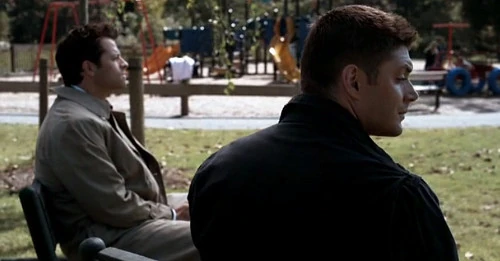
This mirrors Kierkegaard’s Abraham in his questions on God’s will. Indeed, how is one to know whether the command is from God or not? If an angel speaks to him, how does Abraham know it's not a hallucination? And if God himself speaks, how is Abraham, or Castiel, to know whether this is really God or whether the command is their own inward evil wishes? Nobody but Abraham, or Castiel, can decide and they cannot tell within his life whether he has done the right thing or not.
Perhaps it is this introspective nature in Castiel that draws him close to Dean, the human in his charge, and by implication humanity. Dean, a firm non-believer and what many, including himself, perceive to be as farthest from being servant of God as possible, detests the idea of God even in face of angels walking the earth.
DEAN:
God?
CASTIEL:
Yes.
DEAN:
God.
CASTIEL:
Yes! He isn't in heaven. He has to be somewhere.
DEAN:
Try New Mexico. I hear he's on a tortilla.
CASTIEL:
No, he's not on any flatbread.
DEAN:
Listen, Chuckles, even if there is a God, he is either dead—and that's the generous theory—
CASTIEL:
He is out there, Dean.
DEAN:
—or he's up and kicking and doesn't give a rat's ass about any of us.
CASTIEL glares.
DEAN:
I mean, look around you, man. The world is in the toilet. We are literally at the end of days here, and he's off somewhere drinking booze out of a coconut. All right?
- 5.02 Good God, Y'all
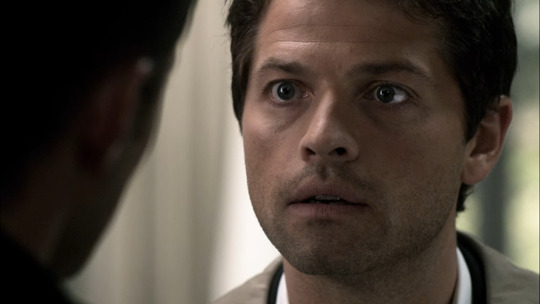
Dean has no intention of trying to prove that God does not exist, as one cannot prove a negative, but the very specific objection to the traditional concept of God above parallels with the simple objection in many existentialists work that is based upon the injustice of the universe. Albert Camus has given this same type of criticism in his novel, "The Plague", in which the priest, Padalu, confesses that he is not able to understand how there can be any justification so that even eternal paradise could cancel out the sufferings here on earth of one innocent child. Why, Deans asks, if God is all powerful, does man have to suffer? If God is merciful, then how can he sentence man, any man at all to eternal damnation?
There is an optimistic side to this. As the repetitive occurrence of the term “free will” on this show suggests, if God exists, man is nothing; but if God does not exist, then man is free to choose what he wants to make himself. But for Castiel to arrive at this destination, it first takes him to undergo a two-season long crisis.
ANNA:
What do you want from me, Castiel?
CASTIEL:
I'm considering disobedience.
ANNA nods.
ANNA:
Good.
CASTIEL:
No, it isn't. For the first time, I feel...
ANNA:
It gets worse. Choosing your own course of action is confusing, terrifying.
ANNA puts her hand on CASTIEL's shoulder. He looks at it; she drops it.
ANNA:
That's right. You're too good for my help. I'm just trash. A walking blasphemy.
ANNA turns to walk away.
CASTIEL:
Anna.
ANNA stops.
CASTIEL:
I don't know what to do. Please tell me what to do.
ANNA turns back.
ANNA:
Like the old days? No. I'm sorry. It's time to think for yourself.
- 4.16 On the Head of a Pin

If God isn’t out there, then Castiel has nowhere to turn. This dreadful realization may best be articulated through Hazel Barnes’ analogy that as if one would try to judge a Ford car without any Mr. Ford. So long as there is a Mr. Ford or one of his agents, then one has a model, one has a blueprint and one can say that the car which is coming there off the assembly line is a perfect Ford or an imperfect Ford. But without a plan, one cannot judge a car, and without God, there is no plan for Castiel and there is no final point of reference by which he can judge his values, or right or wrong, or declare that he has lived up to his possibilities or not lived up to his possibilities.
Yet despite “choosing your own course of action” being “confusing, terrifying,” Castiel is not in total despair. Dean, the human equivalent of the burden of a self-creative life, provides reference for Castiel on how to live a life as if there were no God. I have concluded thus that in the context of existentialism Castiel seeks Dean and humanity for answers and view them as his destination.
Note: this article is MOSTLY arguments in Hazel Barnes’ Self Encounter 2: The Far Side of Despair.
48 notes
·
View notes
Text
youtube
Dietrich Bonhoeffer, a German theologian, is a Christian hero for many. Executed by the Nazis just days before the end of WWII for his participation in a plot to assassinate Hitler, Bonhoeffer is hailed as a 20th-century martyr. But Bonhoeffer struggled with a moral dilemma – his religious views were in stark contrast to the evil he saw all around him. He chose to face possible imprisonment and execution and to remain faithful to the principles of his belief in God. Across the political and theological spectrum, Bonhoeffer is celebrated as an icon of true Christianity and his theological writings are classics throughout the Christian world.
10 notes
·
View notes
Text
So how did we get from this

To this?

Let's talk about the history of Beelzebub!
Beelzebub is strongly associated and indeed often conflated with Baal, a Hellenistic era pagan god worshipped everywhere from the Canaanite city of Ekron to Greece (where he was known as Belus) to Egypt as far back as 1400 BCE. He is first mentioned in the Books of Kings (2 Kings 1:2–3, 6, 16) as Ba'al-zəbûb, meaning "Lord of the Flies" in Hebrew, a possible corruption of "Lord of the High Place" meant to denigrate the deity after he was appropriated and repurposed as a false god, then a demon. Baal worship was extremely difficult for the early Christians to stamp out, so they basically stole other people's mythology and used it as a free idea bucket to fill out the Bible's rogues gallery.
While it's true that in some Ugaritic texts, Baal is depicted as expelling flies and causing sickness, he was still held in high esteem in ancient Canaan and Phoenicia as a powerful deity who controlled the sun, storms, and fertility and who defeated Mot, the god of death and the underworld. The ancient world could get pretty scatological at times! After all, one of Beelzebub's contemporaries, the Egyptian sun god Ra, was often depicted as a dung beetle, then a prominent symbol of rebirth.
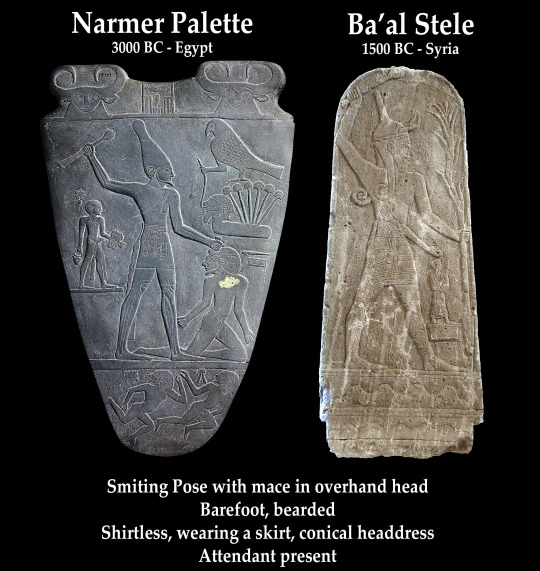
Some scholars think he might have even been the same god! Beelzebub seems to have been the ancient world's go-to demon because the name has been used interchangeably with everyone from Lucifer, Satan, and even Hades in some gnostic texts.
Unfortunately, we don't have much information about Beelzebub's pre-Christian origins other than some iron age ruins in what is now modern day Israel that suggest his temples were decorated with little golden flies, which is pretty neat.
Interestingly, Jesus himself was accused of being a worshipper of Beelzebub multiple times in the New Testament. Maybe the Pharisees were projecting?
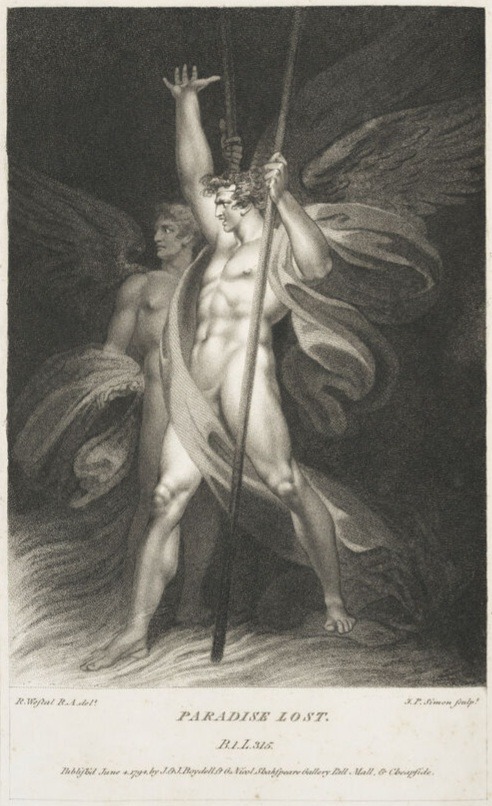
Throughout the Middle Ages, Beelzebub reappeared again in the Lantern of the Light (where he was associated with the sin of envy), De Occulta Philosophia, Princes of Hell, and other demonology texts. 16th-17th Century French Inquisitor Sébastien Michaelis elevated him to the rank of fallen angel in his book The Admirable History of Possession and Conversion of a Penitent Woman: Seduced by a Magician that Made Her to Become a Witch, translated to English in 1613. It was around this time Beelzebub started to become strongly associated with witchcraft. Michaelis should know; he burnt over 14 women accused of being witches!
Unsurprisingly, his name came up repeatedly during the Salem witch trials.
Beelzebub and fellow demons new and old bounced all over different classifications of demons during the 1500s and 1600s. In John Milton's epic poem Paradise Lost, first published in 1667, Beelzebub was part of an unholy trinity consisting of him, Lucifer, and Astaroth. Occultist Johan Weyer decreed that Beelzebub was the Emperor of Hell, having led a successful revolt against the devil. German theologian Peter Binsfield described him as the Prince of Gluttony in his 1589 Treatise on Confessions by Evildoers and Witches. Before that, he was associated with Envy, then Pride.
We even have his personal signature! (At least according to the Grand Grimoir, an anonymous text on black magic of unknown origin)

Beelzebub's physical appearance is even more diverse. He's been depicted as everything from a leopard, a feminine man as tall as a tower, a snake, a calf with a fly's face to...whatever the literal hell this is:
"'dressed like a bee and with two dreadful ears and his hair painted in all colors with a dragon's tail"
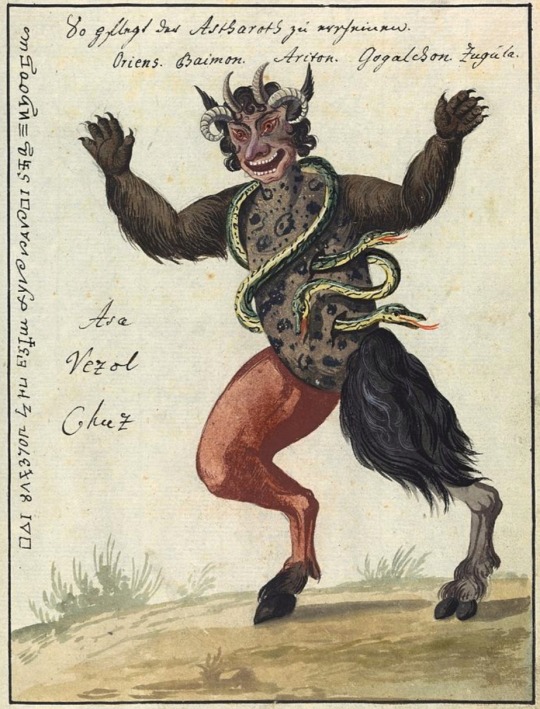

Jacques Albin Simon Collin de Plancy (1793 – 1881)'s Dictionnaire infernal was among the first to depict Beelzebub literally as a fly. No duck feet, no lion's mane. Just a fly.
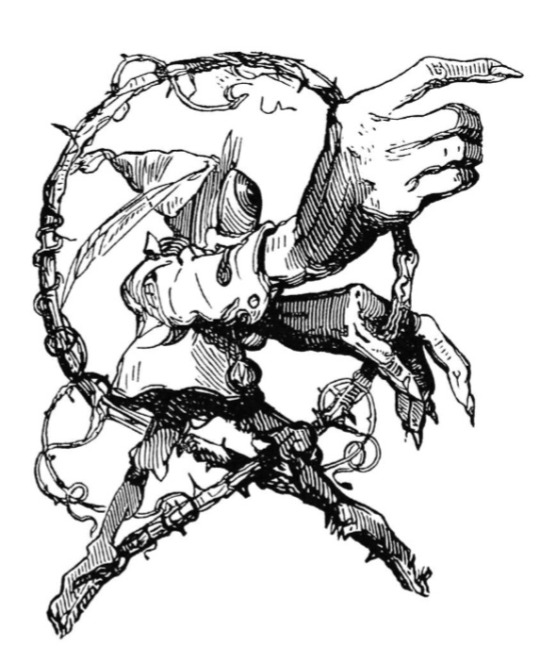
Still better than this.
As Plancy was a skeptic influenced by Voltaire, the book was first intended as a folklore compilation but was later modified to fit with Roman Catholic theology after he converted, much to the consternation of his admirers. Many of his lurid illustrations later appeared in S. L. MacGregor Mathers's edition of The Lesser Key of Solomon...for better or for worse.
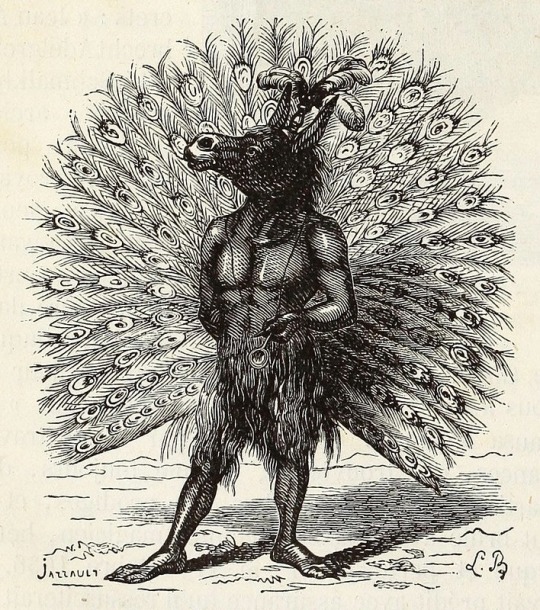
Put Adrammelech in Helluva Boss you cowards.
So basically, Beelzebub has been a public domain character since before King Tut was laid in his golden sarcophagus, and people have been just making shit up about him for millennia. What's your favorite depictation of Beelzebub? This is mine:
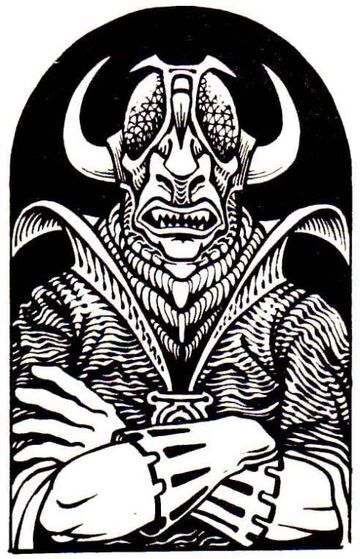
Nothing beats 2nd Edition Dungeons & Dragons artwork.
#helluva boss#queen bee#beelzebub#character design#meta#demonology#history#mythology#long post#vivziepop#dandelion watches hellaverse#religion
40 notes
·
View notes
Text
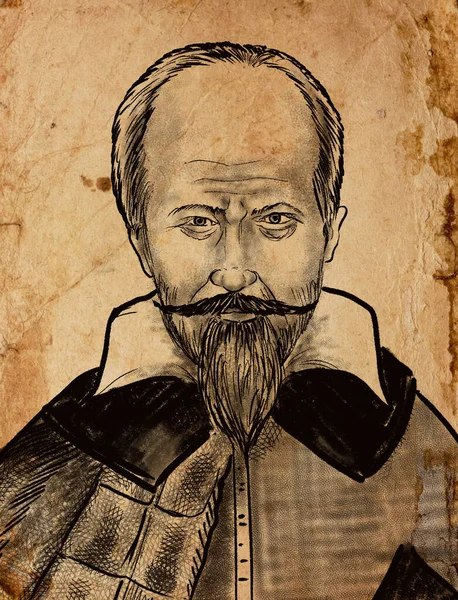

On 17th March 1565, Alexander Ales (also known as Alesius and Aless), theologian and reformer, died.
Alesius played an important role linking the Reformations of Scotland, with Germany, and England. He is believed to have been planning to translate Luther’s German Bible into Scots, but it’s more likely that he intended to use the original Greek and Hebrew manuscripts which Luther himself had used. These were dangerous times in Scotland, the reformation was just kicking off Patrick Hamilton, a friend of Ales was burnt at the stake for heresy, he himself was tried in his absence and also found guilty of heresy, by this time he had fled it is said to have been the first Scot to meet Jean Calvin, Calvin and Ales were both refugees in Germany at the time.
He also spent time in England he was occasionally referred to as Alexander Alesius, Scotus, Doctor Theologiae, Henry VIII had broke with the church of Rome, I found a short snippet on a page about Anne Boleyn, Alexander was visiting the English court at Greenwich Palace, there he witnessed Henry VIII and Anne Boleyn had an argument. He couldn’t hear what it was about but it was clear to him that the King was angry.
Six weeks later the Queen lost her head!
After a time teaching at Cambridge he ended up back in Germany where in Leipzig he passed the remainder of his days in peace and honour, and was twice elected Rector of the University there.
You can find more on the man here https://www.tudorsociety.com/alexander-ales-alesius/
13 notes
·
View notes
Text
DR. MARIA VON WEDEMAYER WELLER // COMPUTER SCIENTIST
“She was an American computer scientist, who emigrated to the US from Germany after the Second World War. She was known in the field of computer science for her role in developing emulation capability. She was also notable as the fiancée of the German Protestant theologian and Resistance worker Dietrich Bonhoeffer.”


9 notes
·
View notes
Text
Etymology of the Stark’s Names
Eddard, Ned: misspelling of Edward, a name of Anglo-Saxon origin composed by the words ēad (wealth, fortune, prosperous) and weard (guardian, protector). His name could be a reference to Edward the Confessor, patron saint of England, the monarchy of England and difficult marriages, or to Edward the Martyr.
Catelyn: a variation of the Irish name Caitlin, which derivates from Katherine and has long been associated with the Greek word katharos (pure, immaculate). Her name could be a reference to Saint Katherine, the patron saint of unmarried girls, maidens and spinsters, craftmen who work with wheels (potters, spinners, millers, knife sharpeners, mechanics), dying people and nurses, jurists and lawyers, educators in general (scholars, archivists, students and schoolchildren, philosophers, librarians and libraries), secretaries and preachers.
Robb: from Robert, a name of proto-Germanic origin composed by the words hroth (fame, glory, honour, praise, renown) and berth (bright, light, shining).
Jon: either a misspelling of John, which is the transliterated and contracted form of the Hebrew name Yehochanan (Yahweh is gracious, merciful) or a shortening of Jonathan (Yahweh has given). There are a lot of saints called John, but the most important is John the Apostle, patron of love, loyalty, friendship, writers in general (authors, scribes, editors, publishers), burn-victims, poison-victims, art-dealers, examinations, scholars and theologians. There's also a Saint Jonathan, whose attributes are bow and arrow and who represents friendship and honesty.
Sansa: most likely named after the stanza, a group of lines within a poem, usually set off from others by a blank line or indentation.
Arya: most likely named after the nymph Aria or Areia, which in Ancient Greek means "warlike." In music, an aria is a self-contained piece for one voice, with or without orchestral accompaniment. Given that all the metaphors for songs and dances being battles and wars in the series, her name could be foreshadowing some crucial role in the War for the Dawn 2.0.
Brandon, Bran: it could be a variation of the Irish name Breandán (prince, king, chieftain) or the Anglo-Saxon surname Brandon, composed by brōm (gorse shrub) and dūn (hill) or brant (deep, steep) and dūn (hill). I'm pretty sure there was a variety of gorse called the lupine, but don't quote me on that. In Old Welsh, the word Brân means "crow, little raven." It could also come from the surname Brand (sword) which derivated from the Old French word brandon (burning material to set fire).
Rickon, Rickard: Rickon is a surname which means “son of Richard.” Rickard is a variation of the name Richard, a name of proto-Germanic origin, composed by the words rīk (ruler, leader, king) and hardu (strong, brave, hardy). Maybe foreshadowing Rickon becoming King in the North? There's also a Saint Richard patron of Wessex.
Benjen: from Benjamin, an Hebrew name which means "son of the right (hand)" although it could also means "son of my days." Often used for the youngest son of a family, specially if the parents are unlikely to have more children.
Lyanna: most likely a misspelling of Eliana. In Hebrew, the name can be literally translated to “my God answered me” or “God answered my prayer.” Eliana could also come from the Late Latin name Aeliāna, the femenine form of Aeliānus (of the sun), or from the Greek name Helen or Helene. Lyanna's name was probably picked to parallel her to Elia, both victims of reproductive abuse at Rhaegar's hands, and as a reference to Helene's abduction.
#asoiaf#valyrianscrolls#my meta#ned stark#catelyn stark#robb stark#jon snow#sansa stark#arya stark#bran stark#brandon stark#rickon stark#rickard stark#lyanna stark#benjen stark#anti rhaegar targaryen#elia martell
210 notes
·
View notes
Text
Thorns might be one of the things that distinguish roses and why they’re sometimes anthropomorphised as capricious beauties or femmes fatales, like the conceited rose that’s the beloved in Antoine de Saint-Exupéry’s The Little Prince. In the Brothers Grimm version of “Sleeping Beauty,” the princess is named Briar Rose (Dornröschen, or “rose with thorns” in German), unsuccessful suitors die after being trapped in the thornbushes around the tower in which she sleeps, and those thorns turn to flowers when the right suitor approaches. The blossom attracts, the thorns repel or exact a price for that attraction. “Truths and roses have thorns about them,” says the old aphorism, and Marianne Moore’s poem “Roses Only,” which, like a surprising amount of poetry, is addressed directly to the rose, ends with the remark “Your thorns are the best part of you.” Medieval theologians speculated that there were roses in the Garden of Eden, but the thorns came after the fall from grace.
Rebecca Solnit, Orwell’s Roses
23 notes
·
View notes